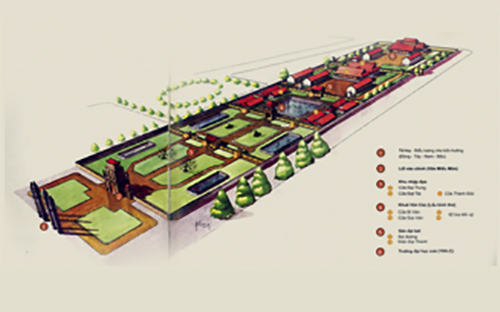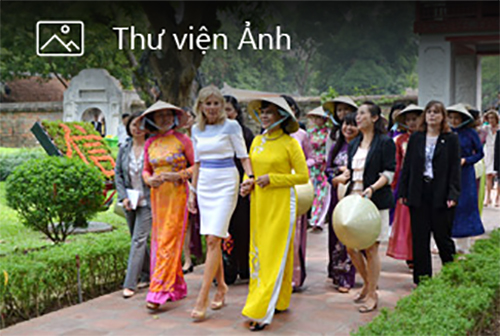PRINCIPAL CHU VAN AN AND VAN MIEU-QUOC TU GIAM IN THANG LONG
Chu Van An, also known as Linh Triet, was born in Quang Liet Commune, Long Dam District(now Thanh Liet Commune, Thanh Tri District, Hanoi) in 1292. As an upright, talented educator, he made considerable contributions to Confucian education of Vietnam, especially to training talents and defining the role of Confucianism in national management and development. For many years, he has become a model educator for many generations in Vietnam. Today, Chu Van An has been still considered as the first Head Master of Quoc Tu Giam who had a significant influence on Van Mieu-Quoc Tu Giam and education system of Vietnam in the 14th Century.

Statue of Chu Van An in Van Mieu-Quoc Tu Giam
Van Mieu and Quoc Tu Giam in Thang Long were established in the late 11th century. Van Mieu- the Temple of Literature was founded in 1070 under the reign of King Ly Thanh Tong to worship Confucius and the Confucian scholars. It was also a place to educate Crown Princes. Six years later (1076), an official state school called Quoc Tu Giam was established as a royal school for royal children.
Under the Ly dynasty, Van Mieu - Quoc Tu Giam did not receive much attention from the court, so education was not fully fostered. During this time, only a few events were recorded, such as in 1075, the court held the first examination to select talented men. This exam can be considered as the first examination in the history of Confucian education. Subsequently, in 1077, the Ly dynasty held another examination, the candidates had to take a written test, then did the maths and answered law questions. However, this exmination was not really a confucian examination. The importance and use of Confucianism had not been appreciated until 1156 when King Ly Anh Tong ordered the foundation of the Temple of Confucius, and 10 years later in1165 confucian examinations were held. Until the end of the Ly dynasty, there are several events recorded as in 1171, the Temple of Confucius was rebuilt; in 1195, the Three- Religion examination (Confucianism, Buddhism, Taoism) was held. Apparently, under Ly dynasty, Confucian studies began to be noticed by the court, but not seriously. Van Mieu and Quoc Tu Giam were founded to honor the ancestor of Confucianism and for the noble children to study there. However, Confucianism and Confucianists had not been really valued in the Ly dynasty.
Tran Thai Tong(Tran dynasty) came to the throne in 1225, ruling over Tran dynasty. The King was interested in training and looking out for talents. In 1232, Tran Thai Tong ordered to hold the first Confucian Examination. The successful candidates would be classified into three ranks based on the levels they had achieved in the exam. Four years later, in 1236, Tran Thai Tong chose not only confucian students but also a special official who was responsible for the work in Quoc Tu Giam. In 1243, King Tran Thai Tong ordered the repairs of Quoc Tu Giam; later in 1246, the king issued a decree that said a doctoral examinations was held every 7 years. After that, in 1247, an examination was held and Nguyen Hien was the best candidate that achieved the title Trang Nguyen, Le Van Huu was the second best one - Bang Nhan, Dang Ma La was the third best one-Tham Hoa. In 1253, the king ordered the establishment of the National Academy and in September that year, he invited his Confucian scholars to the National Academic to teach the Confucian Classics
A series of events proved the importance of Confucianism and Confucian education in society. In particular, the court recognized the role of the teacher in Quoc Tu Giam, so in 1272, King Tran Thanh Tong issued a proclamation for looking out for talents for the position of Principal of Quoc Tu Giam. Thus, Van Mieu-Quoc Tu Giam had truly become the highest education center of Dai Viet. Because it is the place of study for managers, leaders of country, moreover, the training had become better and the person in charge of the school's affairs was a Thuong thu(Now Minister). Candidates would take the exams to obtain Ph.D. certificates-the highest degree. The study here was also the highest level: classics of Confucianism: Four Books and Five Classics Chu Van An was born in the countryside of Thang Long, he was famous for his Confucian knowledge. There is no evidence that he participated and passed any exams but his status and talent were recorded in many documents and handed down among generations. The Complete Annals of Dai Viet by Ngo Si Lien said "An (a native of Thanh Dam district), an upright and disinterested man, he is at home reading books and comprehensively understands confucian teachings, so his class is always full of students. His students then are successful in studies and work for the government. One of his successful students are Pham Su Manh, Le Ba Quat, the both are civil mandarins, however, when they came to visit the teacher, they would kneel down next to his bed talking to their teacher a few sentences and then went away. any bad students were seriously scolded, even got no permission to meet him again. " It is also said by Ngo Si Lien that, Chu Van An was invited by King Tran Minh Tong to the capital to teach the Crown Prince Tran Vuong, and was appointed as the Principal of Quoc Tu Giam.
In the context when the court needed talented people who are interested in teaching Confucianism as mentioned above, so the finding a qualified and wise person like Chu Van An is a good fortune. That King Tran Minh Tong invited him to work as a Principal and at the same time to teach the Prince proves his prestige and talents in academia and society. So far there is no information on exactly what year he was invited to serve as a Principal of Quoc Tu Giam, but there are two things we can say for sure: First, Chu Van An held the highest position in Quoc Tu Giam. Second, he was the first Principal to be officially recognized.
Historically speaking, since Quoc Tu Giam was officially mentioned in 1076, until 1272 it was mentioned that the selecting a Principal for Quoc Tu Giam was carried out, and that the chosen person should be "Good, ethical and expert in Confucian Classics" , but no documents say, in this election, King Tran Thanh Tong selected whom to appoint, and no documents clearly explain What a principal did in Quoc Tu Giam. To further understand, let's try to find out what responsibilities a principal of Quoc Tu Giam took. According to Dr. Dang Kim Ngoc, "Tu nghiep (or Principal), literally, is the person in charge of the education and training of talents" , Therefore, Tu nghiep was the highest position in Quoc Tu Giam.
Thus, it can be seen that Chu Van An was King Minh Tong invited to Quoc Tu Giam and taught the Prince about the end of 1328. The following year, in1329, Prince Vuong came to the throne, it was King Tran Hien Tong . Chu Van An worked throughout the life of Emperor Tông (1329-1341), into the Trần Dụ Tông (1341-1369). In this time, the history said that Chu Van An submitted a petition to the King but was not replied, so he resigned and then secluded himself from society. Thus, the time he submiited the petition to the King was the time he left Quoc Tu Giam, and that is when the court got into a chaotic political situation, many bad civil mandarins abused their power. Said about King Tran Du Tong in the Complete Annals of Dai Viet by Ngô Sĩ Liên, the period of chaos was during the period of Dai Tri (1358-1369). Thus, it can be predicted that in the early 60s of the 14th century, Chu Van An found that King Tran Du Tong did not care about the fate of his nation, so he tried to persuade the king. In contrast, the king did not give him any responses. Thus, the time Chu Van An worked in Quoc Tu Giam is from 1328 to about 1360. With more than 30 years of holding the position of a Principal in charge of education and the training of talents in Quoc Tu Giam, Chu Van An did specific work that contributed to the development of Confucianism, and to training talents for the country. There are no specific records of the work that Chu Van An did at the school, but it is certain that, in addition to teaching the Prince, Chu Van An took responsibility for education in Quoc Tu Giam. He must have planned and prepared for the content of learning and training for the children at the school. Perhaps the lectures, educational content of Chu Van An during his career were summarized from the lectures when he was a teacher at the school in Huynh Cung, and then, gathered into the book Tu thu thuyet uoc that the later generations have been still referring to (unfortunately, we have not found this book yet). During the period when Chu Van An was still in office(from about 1328 to 1460), the court did not hold any examinations (or it did but the events were not recorded in historical documents). Except in 1345, the document did not list the name of the people who had passed, as well as their significant contributions to the educational development of the country. Possibly, the court had no need for personnel, or held examinations but not excellent people were found. This needs more evidence, but there can be a hypothesis that at that time, Quoc Tu Giam had trained enough personnel for the court, so the court had no need to look out for more talents in the society. If so, then the contribution of Chu Van An is so great. That explains why later generations highly appreciate Chu Van An's contribution to education, consider him "the model Confucianist to be worshiped in the Temple of Literature "
Chu Van An left the Quoc Tu Giam at the age of 60, even then he was invited to hold another positions (not Principal of Quoc Tu Giam), but he refused. But his life, born to have a special relation with the Temple of Literature, so when he died in 1370, he was worshiped here. This must have been a big decision of the court at the time, and a special blessing to Chu Van An. He was the first Vietnamese to be worshiped in the Temple of Literature. After that, Truong Han Sieu and Do Tu Binh were two other Vietnamese people who were worshiped by Tran dynasty in 1372 and 1380. The worship of the three men in The Temple of Literature marks the important step in the reception of Confucianism. However, among the three who were worshiped in the Temple of Literature under the Tran Dynasty, only Chu Van An was the one who was considered by the following generations to be the most worthy.
Over the course of history, even when Confucianism is no longer used since the last examination held in 1919, Chu Van An has always been a symbol of Vietnamese education, always honored and respected in Van Mieu. In particular, to honor the study, honor the model teacher of Vietnam, the state had the statue of Chu Van An made in 2003 and honored him at the first floor of Rear building(Thai Hoc section) where he taught his students.
the statue of Chu Van An at Van Mieu-Quoc Tu Giam is now put in the middle of the Rear building, where thousands of people come to offer incense. It is a reverence, honor of this generation. Hopefully, the generations of Vietnamese, as well as tourists always pay their respects to the moral teacher. Hence, they try to follow the good example of the predecessors . Chu Van An - the model teacher of Vietnamese education, who has associated with the development of Van Mieu - Quoc Tu Giam has become a symbol of education in Vietnam.
Writer: Nguyen Van Tu
Source: Scientific seminar “Chu Van An-Life and Cereer”
Translator: Chuong Van














 Guide to finding the way
Guide to finding the way
